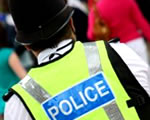 Go to main content
Go to main content
Archive Website of the UK government
Please note that this website has a UK government accesskeys system.
Main menu
Page menu
Crime and justice

Being stopped, questioned or arrested by the police

The police have powers to stop, question and search you - depending on the situation. If necessary, they can arrest you if they believe you have committed a crime. Find out when you can be stopped by the police, what happens if you’re searched or arrested and your rights.
Being stopped and questioned by the police
A police officer must show you their identity card
A police officer or a police community support officer (PCSO) has the right to ask you:
- what you’re doing
- why you’re in an area and/or where you’re going
The officer may record your ethnicity and you may be given a record showing the:
- date and time you are stopped
- officer’s name and police station
A police officer does not have to be in uniform (but must show you their identity card). A PCSO must be in uniform.
Being stopped and searched by the police
You can be stopped and searched when a police officer has ‘reasonable grounds’ to suspect that you’re carrying:
- illegal drugs
- a weapon - for example, a knife
- stolen property
- something which could be used to commit a crime - for example, a crowbar
Being searched doesn’t mean you are being arrested.
‘Reasonable grounds’ for stop and search - an example
You are seen late at night close to where a burglary has taken place. The police see you’re trying to hide something that seems to be the same size and description of the item stolen in the burglary.
You could be stopped and searched in this situation.
Being stopped and searched without any reasonable grounds
You can be stopped and searched without any reasonable grounds if a police officer thinks that:
- serious violence could take place
- you’re carrying a weapon or have used one
Before you’re searched
Before you’re searched the police officer must tell you:
- their name and police station
- what they expect to find - for example, drugs
- the reason they want to search you - for example, it looks like you’re hiding something
- why they are legally allowed to search you
- that you can have a record of the search - if not possible at the time, how you can get a copy
How the search is carried out
An officer can ask you to take off more than your jacket or gloves, and anything worn for religious reasons - like a veil or turban. If they do, they must take you somewhere out of public view.
If the officer wants to remove more than jacket and gloves they must be the same sex as you. This may happen at a police station (even if you’re not arrested).
What is written down on the search record
After you are searched (if you are not arrested) the officer should give you a record which includes:
- what they were looking for and if anything was found
- why you were searched
- the date, time and place of the search
- the identity of the officer carrying out the search
If they can’t give you a record at the time, they should give you a ‘receipt’ which tells you how to get one.
When the police can enter your home
Normally, the police can’t enter your home (or private property) without your permission, unless:
- they’re chasing someone who’s committed a serious crime - like robbery or assault
- they’re stopping serious damage to your property
- they hear a ‘cry for help’ or someone in distress
- they have permission to enter your home from a court
Being arrested
The police need reasonable grounds to suspect you may be involved in a crime
You can be arrested anywhere and at any time, including:
- on the street
- in your home
- at work
The police need ‘reasonable grounds’ to suspect you are, or may be, involved in a crime to be able to arrest you.
What happens at the time of arrest
If the police arrest you, they must:
- identify themselves as the police
- tell you that you're being arrested
- tell you what crime they think you have committed
- explain why it's necessary to arrest you
- explain to you that you’re not free to leave
If you try to escape or become violent, the police can use 'reasonable force' - for example, holding you down so you can’t run off. You can also be handcuffed.
The police can also search you when you’re arrested.
After arrest, you will be taken to a police station and held in custody. This means you are not free to leave.
See 'Your rights at a police station' to find out more about what happens when you’re arrested, being questioned and your rights.
